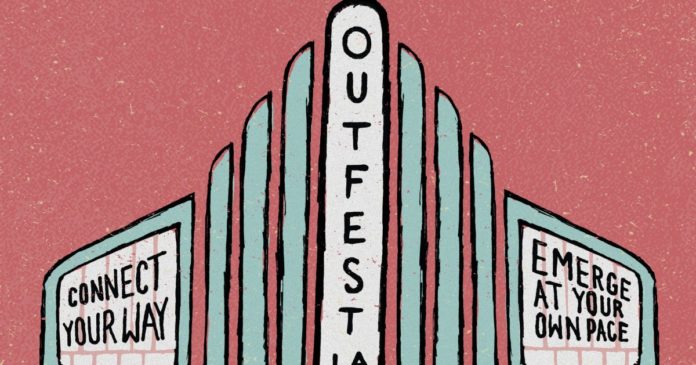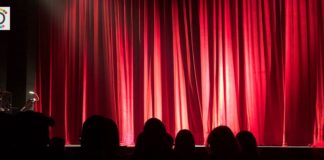
Outfest LA kicks off its annual film festival on August 13, marking 39 years of showcasing groundbreaking LGBTQ+ cinema from Los Angeles and beyond.
Billed as the world’s leading LGBTQ+ film and television festival, Outfest LA 2021 features over 170 handpicked films representing fifty countries and fifteen languages. Attendees can choose between in-person screenings at the Directors Guild of America (DGA), Outfest’s longtime home, or online streaming.
Outfest supports the development of diverse LGBTQIA+ storytelling and representation in media, arts and entertainment. The 501 (c) (3) non-profit organization holds year-round programs and workshops such as the Young Filmmakers Project, Screenwriting Lab and the Anthony Meindl Trans Actors Fellowship. There’s also the Outfest Fusion Festival, a film and television festival dedicated to works by people of color.
We’re a destination for communities all over the world. Why can’t we be world-renowned for queer film?
Damien Navarro, Executive Director, Outfest
These and other programs provide critical pathways and opportunities for developing queer storytelling talent in an industry that has a long history of transmitting homophobic, transphobic and racist images of LGBTQ+ characters in cinema and television — let alone the harassment, invisibility and gatekeeping that prevents many queer filmmakers and actors from achieving success, mainstream or otherwise. The now-infamous blunder around the 2017 Best Picture win for “Moonlight” at the Oscars is just one high-profile example of how easily Hollywood, entrenched in #OscarsSoWhite predictability, can ‘slip’ and declare “La La Land” the winner almost out of habit.
But Los Angeles is more than Hollywood, and with “L.A.” in its name, Outfest strives to tell queer L.A. stories in all of their localized specificity, complex diversity and transnational reach in an era of pandemic isolation.
“We’re L.A., home of the industry. We have Los Angeles in our name,” notes Executive Director Damien Navarro. “We’re a destination for communities all over the world. Why can’t we be world-renowned for queer film? We want to re-introduce ourselves to Los Angeles and the industry right here.”
More Film and Photography Stories
Outfest’s signature event, its namesake Outfest LA annual film festival, has grown into a global cinematic occasion from its modest beginnings as a gay and lesbian film festival that was started by UCLA graduate students in 1982. The group was called the Gay and Lesbian Media Coalition of Los Angeles and its members were backed by the UCLA Film and Archives director who supported the idea of a gay and lesbian film festival on campus when university officials did not. This was in the conservative Reagan 1980s, when the US had a president whose administration joked about AIDS and called it “the gay plague,” a time of “pervasive censorship of the gay and lesbian experience in mainstream media.”
According to a 2012 article in L. A. Weekly, buoyed by interest in the original school-based festival, the group that would become “Outfest” moved its film screenings “into town.” The only affordable space was an “on-again, off-again porn theater” in the Mid-Wilshire district, drawing the ire of the L. A. City Council. A 1989 affiliation with the DGA bestowed “legitimacy” on Outfest LA, which helped it grow with each corporate and community sponsor.
Now in its 39th year, Outfest LA is a vanguard for the best in queer cinema. It boasts an international profile as a “trailblazer for multicultural LGBTQIA+ representation in entertainment.” Outfest LA was the first to screen “breakout hits” such as “Hedwig and the Angry Inch,” “Priscilla, Queen of the Desert” and “But I’m a Cheerleader.” It remains committed to spotlighting independent filmmakers such as Aurora Guerrero (“Mosquita y Mari”) and Cheryl Dunye (“Watermelon Woman”), as well as work in television such as Tanya Saracho’s STARZ hit, “Vida.” And as an Academy Award qualifier, Outfest LA has launched a number of Jury Award queer narrative short films into Oscar’s orbit of consideration. “We have numerous exhibition opportunities across live events, streaming, two festivals and many global partnerships, and that gives us incredible reach and recognition,” notes Navarro.
He names three reasons for Outfest LA’s incredible longevity and prosperity over the years. “First, we reflect the voices and stories of a city like Los Angeles, so we’ve been able to keep pace with reflecting the changes in the world and our communities. Second is the diversity of the organization’s work outside of the festival, including education, mentorship and film restoration programs aimed to support storytellers across their entire career, from outset to legacy. Finally, we continue to push ourselves to adapt how audiences, filmmakers and the industry access our programming, which I believe provides a strong case for support for those interested in helping drive our mission forward to transform the world through story.”
As we work towards social equity our stories can help get us there. Plus, we will always need a space where we can celebrate who we are, without apology.
Adelina Anthony, filmmaker
Filmmaker Adelina Anthony is one of hundreds of LGBTQ+ storytellers whose work has been supported by Outfest in recent years. The Two-Spirit Xicana artist wrote, directed, co-produced and acted in two films featured in this year’s program. In an email to KCET,
Anthony expressed her admiration for an organization that provides a great platform for unnoticed filmmakers and that “continues to evolve” by listening to the needs of constituents, “especially QTBIPOC folks who continue to gain access to filmmaking tools.” And while there has been “some improvement” in LGBTQ+ representation in television and cable, Anthony cautions against premature celebration.
Learn more about the films on Outfest LA this year.
“You just need to look at the data GLAAD or USC Annenberg gathers on industry hiring and content creation practices to know [film and television] still have a long way to go,” writes Anthony. “Ultimately, there’s still urgency in our queer lives (look at all of the anti-trans laws hostile politicians are pushing). As we work towards social equity our stories can help get us there. Plus, we will always need a space where we can celebrate who we are, without apology. Outfest offers that to many of us.”
Navarro is proud of how far the film festival has come since its early days, and of the space it continues to create for queer stories going forward. “I’m still learning the history, and our history is still in progress” he told KCET, “but it also feels like we’re just getting started again” because of the pandemic.
“I have never been through a ‘normal’ festival,” said Navarro, who started the Executive Director position in 2019. The 2020 edition of Outfest LA, like countless other early-pandemic events, moved online. “I learned a lot about streaming, protocols and indoor-outdoor access,” he said.
Navarro emphasizes the importance of continuing to take precautions in this current pandemic moment of rising COVID-19 Delta variant cases. For starters, for those who wish to watch films at the DGA, “we’re requiring everyone to be vaccinated.” Un-vaccinated people must show proof of a negative COVID-19 test taken in the last 48 hours. DGA theaters will enforce social distancing, face masks and capacity limits. Those who want to enjoy the films from home can purchase Outfest LA streaming passes or virtual tickets to individual programs.
Even in the pandemic, Navarro noted the significance of producing Outfest LA for queer filmmakers in general, and specifically for queer of color directors, screenwriters and actors. “Filmmakers of color need six to seven times the introduction into the industry,” he said. “In Outfest, we now have our own platform to develop storytelling talents behind and in front of the camera, for big and small screens.”
He admires the PBS Short Film Festival as a model for launching independent projects into accessible public viewing. “We want to be a credible media partner as well as the originator and distributor of stories,” said Navarro. “At Outfest, we have a different set of policies and values that we live by. Our guiding principles aim to do good work, not exploit our stories and talent.”
The program this year features nearly 200 films in 15 languages from 50 countries. The films present gay, lesbian, trans, nonbinary and other queer heroes, villains, sidekicks and other characters in all their complexities and contradictions. They show us how capacious ‘queer’ is and can be beyond Hollywood’s tired stereotypes. “We’re finally seeing some of the nuance in queer lives,” said Navarro. “We’re protagonists and antagonists and villains, but not in the way we’ve been typically portrayed.”
Mike Dougherty, Director of Festival Programming, provided this comment to KCET via email: “As I look over our program, I’m hard-pressed to find a film that doesn’t go outside the typical, limiting Hollywood portrayal. These are filmmakers working outside of that system with the freedom to create characters with depth, contradictions and complexity beyond what you’ll ever see in the studio system.”
This year’s Outfest LA features a mix of horror, sci-fi, animation and experimental short films alongside narrative and documentary films. We’ll meet a pro-life lesbian single mom and veteran, a “weird” queer boy from rural Alabama, a gay Russian potato-farmer who immigrates to the USA and a trans woman in South Korea who must appear for a military examination, among so many other compelling and unique characters.
As Navarro reminds us, “Young storytellers are demanding our bravery. We have to remove barriers and do our own soul-searching: how do we account for our own history as an organization that has sometime participated in gatekeeping? And what would we want to look like 20 years from now?”
Outfest LA runs from August 13-22 in person and online. Visit Outfest LA for more information.








